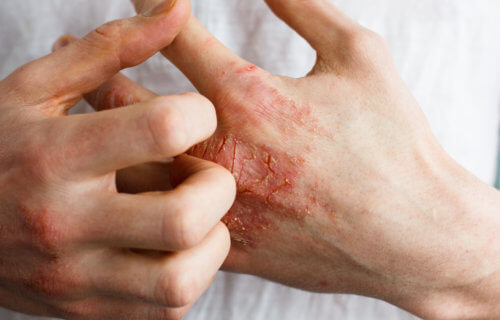STANFORD, Calif. — People with asthma and eczema have a higher risk of developing osteoarthritis, warns a new study. Researchers have linked these allergic conditions to a higher chance of developing the most common type of arthritis. The research goes on to suggest that treatments for allergic reactions could help decrease the risk of having joint problems.
Commonly known as “wear and tear” arthritis, study authors note that osteoarthritis occurs when the cartilage that cushions and protects the ends of your bones breaks down. Middle-aged and older adults are the most prone to developing osteoarthritis, but the current study adds another vulnerable group of people to that list. According to the National Institutes of Health, eczema (or atopic dermatitis) is an inflammatory skin condition affecting roughly 30 percent of the U.S. population at some point in their lives.
The study authors analyzed medical claims submitted to a nationwide U.S. insurance database between 2003 and 2019. There were 117,346 people with either allergic asthma or eczema. The average person in the study was middle-aged, with 60 percent identifying as women. The team then compared the group with allergies to another group of people in the database without allergies.
People with allergic asthma or eczema were 58 percent more likely to develop osteoarthritis within the next eight years compared to people without allergies. To put that into perspective, there would be 27 new cases versus 19 new cases of arthritis if the team monitored 100 people with and without allergies over the next 10 years.
Among the 4,325 with eczema and allergic asthma, people were twice as likely to develop osteoarthritis than healthy individuals. The risk also differed depending on the breathing conditions people have. People with allergic asthma were 83 percent more likely to have osteoarthritis over eight years than those with chronic obstructive pulmonary disease (COPD). While both conditions involve the airways, the researchers suggest having COPD has less of a connection because it does not involve allergic pathways.

One of the potential reasons people with allergic reactions may develop osteoarthritis is because of their overactive immune system. More specifically, there is growing evidence suggesting the activation of a white blood cell called mast cells and inflammatory chemicals during an allergic reaction contributes to the gradual breakdown of joint tissues.
The team also looked at the health records from the Stanford Research Repository between 2010 and 2020 to see if they would find a similar pattern. Their predictions continued to be right as there was a 42-percent higher risk among those with allergic asthma or eczema and a 19-percent higher risk if someone had both conditions.
Obesity has been known to raise the risk of osteoarthritis because it puts extra stress on weight-bearing joints like the hips. Since the medical records showed a weaker association between allergies and osteoarthritis, it’s likely there are other factors involved in the development of the disease. Study authors say another point to consider is the lack of information on the severity of allergic asthma or osteoarthritis and over-the-counter medication. The team notes these limitations may influence the study findings.
“If this is indeed true, non-atopic patients may also benefit from the use of treatments that inhibit mast cells and allergic cytokines to treat or prevent [osteoarthritis],” researchers say in a media release.
The study is published in the Annals of the Rheumatic Diseases.

